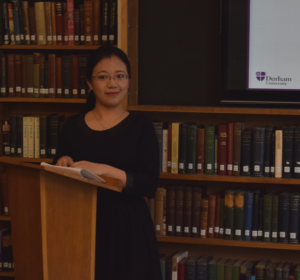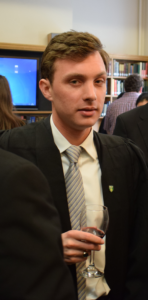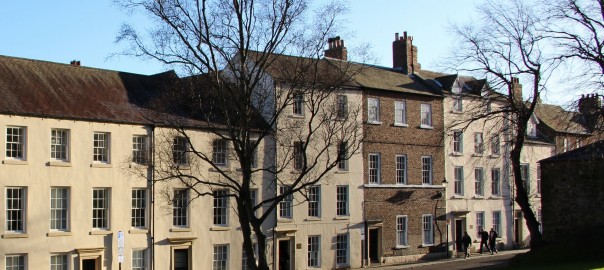The first Research Forum of Easter Term on 12 May saw a very good turnout, with members from all three common rooms present.

The evening began with a talk by Jiahao Guo (Department of Modern Languages), who presented on English translations of Chinese literature. Exploring how Chinese idioms in Mo Yan’s works have been lost in the English translation, Jiahao demonstrated how these omissions result in less-rounded characters. Moreover, the translator had embellished the critique of the Chinese political system when compared to Yan’s original texts. Jiahao’s findings suggest that the focus of Yan’s translator was not actually to transmit Chinese culture to an English-speaking audience. Instead, the translations seem to be carefully tailored to the expectations of the intended Western audience. This opens the question of whether the translations are Chinese literature in English, or whether the texts are, in fact, English literature.
 Afterwards, Samuel Lindan (Department of Classics) gave his talk on the architectural studies and designs of Italian polymath Leon Battista Alberti, particularly his seminal work De re aedificatoria, finished in 1452 and published in 1485. This work established Alberti’s theory of architecture, and its influence on later Renaissance architects is difficult to over-estimate. Through a visual analysis of a sample of Alberti’s architectural designs, Samuel showed the audience that although Alberti clearly drew heavily on inspiration from the classics, he nevertheless had a keen sense of incorporating contemporary architecture into his works.
Afterwards, Samuel Lindan (Department of Classics) gave his talk on the architectural studies and designs of Italian polymath Leon Battista Alberti, particularly his seminal work De re aedificatoria, finished in 1452 and published in 1485. This work established Alberti’s theory of architecture, and its influence on later Renaissance architects is difficult to over-estimate. Through a visual analysis of a sample of Alberti’s architectural designs, Samuel showed the audience that although Alberti clearly drew heavily on inspiration from the classics, he nevertheless had a keen sense of incorporating contemporary architecture into his works.
This Research Forum was followed by a wine reception, which gave members of the audience a chance to ask the speakers any lingering questions. It was such a success that we plan to continue in future.
Be sure to turn up for the next Research Forum, on 2 June at 6pm in the Williams Library. Lan Dong will present on the influence of music on English child choristers’ lives, while Sam Fearn’s talk will explore how discoveries in physics can sometimes drive mathematical research. All are welcome.

